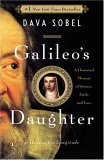Summary | Excerpt | Reading Guide | Reviews | Readalikes | Genres & Themes | Author Bio

Critics' Opinion:
Readers' Opinion:
First Published:
Oct 1999, 448 pages
Paperback:
Oct 2000, 432 pages
Galileo, now fifty-nine, also stood boldly alone in his world-view, as Suor Maria Celeste knew from reading the books he wrote and the letters he shared with her from colleagues and critics all over Italy, as well as from across the continent beyond the Alps. Although her father had started his career as a professor of mathematics, teaching first at Pisa and then at Padua, every philosopher in Europe tied Galileo's name to the most startling series of astronomical discoveries ever claimed by a single individual.
In 1609, when Suor Maria Celeste was still a child in Padua, Galileo had set a telescope in the garden behind his house and turned it skyward. Never-before-seen stars leaped out of the darkness to enhance familiar constellations; the nebulous Milky Way resolved into a swath of densely packed stars; mountains and valleys pockmarked the storied perfection of the Moon; and a retinue of four attendant bodies traveled regularly around Jupiter like a planetary system in miniature.
"I render infinite thanks to God," Galileo intoned after those nights of wonder, "for being so kind as to make me alone the first observer of marvels kept hidden in obscurity for all previous centuries."
The newfound worlds transformed Galileo's life. He won appointment as chief mathematician and philosopher to the grand duke in 1610, and moved to Florence to assume his position at the court of Cosimo de' Medici. He took along with him his two daughters, then ten and nine years old, but he left Vincenzio, who was only four when greatness descended on the family, to live a while longer in Padua with Marina.
Galileo found himself lionized as another Columbus for his conquests. Even as he attained the height of his glory, however, he attracted enmity and suspicion. For instead of opening a distant land dominated by heathens, Galileo trespassed on holy ground. Hardly had his first spate of findings stunned the populace of Europe before a new wave followed: He saw dark spots creeping continuously across the face of the Sun, and "the mother of loves," as he called the planet Venus, cycling through phases from full to crescent, just as the Moon did.
All his observations lent credence to the unpopular Sun-centered universe of Nicolaus Copernicus, which had been introduced over half a century previously, but foundered on lack of evidence. Galileo's efforts provided the beginning of a proof. And his flamboyant style of promulgating his ideas--sometimes in bawdy humorous writings, sometimes loudly at dinner parties and staged debates--transported the new astronomy from the Latin Quarters of the universities into the public arena. In 1616, a pope and a cardinal inquisitor reprimanded Galileo, warning him to curtail his forays into the supernal realms. The motions of the heavenly bodies, they said, having been touched upon in the Psalms, the Book of Joshua, and elsewhere in the Bible, were matters best left to the Holy Fathers of the Church.
Galileo obeyed their orders, silencing himself on the subject. For seven cautious years he turned his efforts to less perilous pursuits, such as harnessing his Jovian satellites in the service of navigation, to help sailors discover their longitude at sea. He studied poetry and wrote literary criticism. Modifying his telescope, he developed a compound microscope. "I have observed many tiny animals with great admiration," he reported, 11 among which the flea is quite horrible, the gnat and the moth very beautiful; and with great satisfaction I have seen how flies and other little animals can walk attached to mirrors, upside down."
Shortly after his sister's death in May of 1623, however, Galileo found reason to return to the Sun-centered universe like a moth to a flame. That summer a new pope ascended the throne of Saint Peter in Rome. The Supreme Pontiff Urban VIII brought to the Holy See an intellectualism and an interest in scientific investigation not shared by his immediate predecessors. Galileo knew the man personally--he had demonstrated his telescope to him and the two had taken the same side one night in a debate about floating bodies after a banquet at the Florentine court. Urban, for his part, had admired Galileo so long and well that he had even written a poem for him, mentioning the sights revealed by "Galileo's glass."
Copyright © 1999 Dava Sobel





The Flower Sisters
by Michelle Collins Anderson
From the new Fannie Flagg of the Ozarks, a richly-woven story of family, forgiveness, and reinvention.

The House on Biscayne Bay
by Chanel Cleeton
As death stalks a gothic mansion in Miami, the lives of two women intertwine as the past and present collide.

The Funeral Cryer by Wenyan Lu
Debut novelist Wenyan Lu brings us this witty yet profound story about one woman's midlife reawakening in contemporary rural China.
Your guide toexceptional books
BookBrowse seeks out and recommends the best in contemporary fiction and nonfiction—books that not only engage and entertain but also deepen our understanding of ourselves and the world around us.